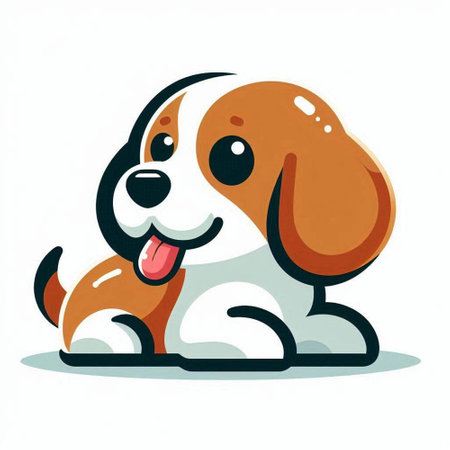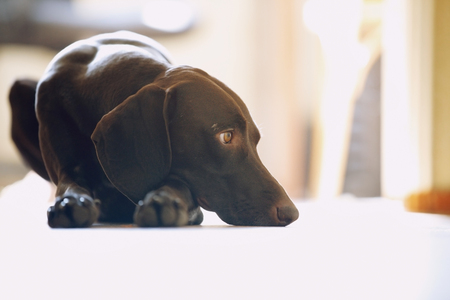1. Understanding Why Dogs Snore
If your dog keeps you up at night with loud snoring, you’re not alone! Snoring is a common issue for many dog owners in the U.S., and understanding why it happens is the first step to helping everyone get a better night’s sleep. Let’s break down the usual suspects behind those noisy nights.
Breed Tendencies
Some dog breeds are simply more prone to snoring than others. This is mostly due to their unique facial structures or “anatomy.” For example, flat-faced (brachycephalic) breeds have shorter noses and narrower airways, which can make breathing noisier—especially when they’re asleep.
| Breed | Snoring Likelihood | Reason |
|---|---|---|
| Bulldog | High | Short nose and narrow airway |
| Pug | High | Brachycephalic features |
| Boxer | Moderate-High | Short muzzle |
| Labrador Retriever | Low-Moderate | Tends to gain weight easily |
| Dachshund | Low | Longer snout, less likely to snore unless overweight |
Age Factors
Just like people, dogs tend to snore more as they get older. Aging can cause tissues in their throat to relax, which makes it easier for them to vibrate and create that familiar snoring sound. Puppies usually don’t snore much unless there’s a health issue.
Anatomical Features That Matter
Certain physical traits can also make a dog more likely to snore, regardless of breed or age:
- Short noses or flat faces: These features make it harder for air to move freely through the airway.
- Obesity: Extra fat around the neck puts pressure on the airway, increasing snoring risk.
- Nasal obstructions: Things like allergies, colds, or even sleeping with their head in an odd position can block airflow and trigger snoring.
- Mouth shape or long soft palate: If your dog has an unusually long soft palate (the tissue at the back of the mouth), it can flap around and cause noise while breathing in and out.
A Quick Reference Table: Common Causes of Dog Snoring
| Cause | Description/Why It Matters |
|---|---|
| Brachycephalic Breeds | Narrow airways increase vibration and noise during sleep. |
| Aging Tissues | Throat tissues relax more with age, making vibrations easier. |
| Obesity | Extra neck fat compresses airways, causing more snoring. |
| Nasal Blockages/Allergies | Irritated or blocked nasal passages disrupt normal airflow. |
| Poor Sleeping Position | Certain positions can temporarily restrict breathing passages. |
If you know why your dog snores, you’ll be better equipped to figure out what changes might help both of you sleep better!
2. Is Snoring Normal or a Concern?
It’s not unusual for dog owners to hear their furry friends snoring away, especially during deep sleep. But how do you know if your dog’s snoring is just part of their charm or if it’s a sign of something more serious? Let’s break down when snoring is harmless and when it might be time to call your vet.
When Is Dog Snoring Harmless?
Most of the time, snoring in dogs is totally normal and nothing to worry about. Some breeds are just more prone to snore because of their facial structure—think Bulldogs, Pugs, and Boston Terriers. Your dog might also snore more after a busy day at the dog park or if they’re sleeping in a funny position.
Common Harmless Causes of Dog Snoring
| Cause | Description |
|---|---|
| Breed Traits | Brachycephalic (short-nosed) breeds have narrow airways that make them natural snorers. |
| Sleeping Position | Lying on their back can cause the tongue to partially block the airway, leading to light snoring. |
| Tiredness | A tired pup may enter deeper sleep, which can sometimes cause mild snoring. |
| Minor Allergies | Dust or pollen may cause temporary congestion, resulting in occasional snoring. |
When Should You Be Concerned?
If your dog’s snoring starts suddenly or gets much louder, it could be a sign of an underlying health issue. Watch for other symptoms like coughing, gasping for air, difficulty breathing, or changes in energy levels. These could mean there’s a problem needing veterinary attention.
Warning Signs That Require a Vet Visit
| Sign | What It Might Mean |
|---|---|
| Loud or Sudden Onset Snoring | Could indicate airway obstruction or infection. |
| Panting or Difficulty Breathing When Awake | Might point to respiratory issues such as kennel cough or even heart problems. |
| Nasal Discharge or Sneezing | May signal an upper respiratory infection or allergies that need treatment. |
| Behavior Changes (lethargy, loss of appetite) | General signs of illness that should not be ignored. |
| Coughing or Gagging | Might mean something is stuck in the throat or there is irritation in the airway. |
If you ever feel unsure about your dog’s snoring, it’s always okay to check with your veterinarian. They can help figure out if it’s just noisy sleeping or something that needs medical care.
Understanding what’s normal for your own pet will help you spot any changes early and keep your best friend healthy and happy!

3. How Snoring Affects Sleep—for You and Your Pet
Snoring might seem like a harmless or even funny habit, but it can have a bigger impact on sleep than you might think. In many American homes, dogs are not just pets—they’re family members who often share beds or sleep in the same room as their owners. When your dog snores, it doesn’t just affect them; it can also disrupt your own sleep, especially if you’re a light sleeper or live in an apartment where space is limited.
How Snoring Impacts Your Dog’s Rest
Just like people, dogs need restful sleep to stay healthy and happy. Persistent snoring can sometimes mean your dog isn’t getting enough quality rest. This may lead to:
- Daytime drowsiness: Your pup might be less playful or more irritable.
- Behavioral changes: Lack of good sleep can make dogs anxious or moody.
- Health risks: Chronic poor sleep may increase the risk of certain health problems down the road.
The Effect on Owners’ Sleep Quality
If your dog’s snoring is loud enough to wake you up or keep you from falling asleep, it can leave you feeling tired and groggy the next day. This is especially true in typical American living situations such as:
- Sharing a bed with your dog: Many people let their dogs sleep under the covers or right next to them, which makes snoring hard to ignore.
- Small apartments or bedrooms: There’s nowhere to escape the noise if space is tight.
- Keeps kids awake: If your dog snoozes in your child’s room, it could keep them up at night too.
The Impact of Dog Snoring on Sleep—At a Glance
| Your Dog | You (the Owner) | |
|---|---|---|
| Lack of Deep Sleep | Yes—can lead to tiredness and moodiness | Yes—frequent interruptions reduce sleep quality |
| Daytime Drowsiness | May nap more during the day | Might feel sluggish at work or school |
| Irritability/Restlessness | Might act out or seem anxious | Could feel more stressed or impatient |
| Affects Whole Family? | Noisy breathing may worry family members | Everyone sharing close quarters may be affected |
Why It Matters in American Homes
Because dogs are often considered part of the family in the U.S., their comfort and well-being are a priority. At the same time, Americans value good sleep because busy schedules demand energy and focus. When a dog’s snoring gets in the way, it impacts everyone’s routine—from morning walks to work meetings and school drop-offs.
4. Home Remedies and Environmental Adjustments
Simple Ways to Help Your Snoring Dog Sleep Better
Snoring in dogs can be cute, but if it keeps you or your pup awake, it’s time to try some home remedies and small changes to make everyone’s sleep more peaceful. Here are some practical tips you can use at home:
Adjust Your Dog’s Sleeping Position
Just like people, a dog’s sleeping position can affect how loudly they snore. Encourage your dog to sleep on their side instead of their back, which helps keep their airway open.
| Sleeping Position | Effect on Snoring |
|---|---|
| Back | Can make snoring worse |
| Side | Often reduces snoring |
| Curl (Tucked Up) | Might also help minimize snoring |
Choose Supportive Bedding
A good dog bed supports your pup’s head and neck, helping keep airways clear. Orthopedic or memory foam beds are great choices for older dogs or breeds prone to snoring.
Features to Look for in Dog Beds:
- Raised edges for head support
- Firm but comfortable material (like memory foam)
- Easy-to-clean covers for hygiene
Improve Air Quality with Purifiers and Humidifiers
Dry air and dust can make snoring worse. Using an air purifier helps remove allergens and dust from the room, while a humidifier adds moisture to the air, making it easier for your dog to breathe at night.
| Device | Main Benefit | How It Helps Your Dog |
|---|---|---|
| Air Purifier | Removes allergens and dust | Keeps airways clearer, less irritation |
| Humidifier | Adds moisture to the air | Eases breathing, especially in dry climates or winter months |
Keep Your Dog’s Sleeping Area Clean and Comfortable
Regularly wash bedding and vacuum around your dog’s favorite sleeping spots. This reduces allergens that can cause congestion and snoring.
Avoid Overfeeding and Maintain a Healthy Weight
Extra weight can put pressure on your dogs airway. Stick to healthy portions and regular exercise as recommended by your vet.
5. When to Seek Professional Help
Sometimes, a dog’s snoring can be more than just a noisy nighttime habit. While occasional snoring is common in many breeds, certain signs may indicate an underlying health issue that needs professional attention. Here’s how you can tell when it’s time to consult your vet or a pet specialist about your dog’s snoring, and what you can expect during the visit.
Signs You Should Call the Vet
| Warning Sign | What It Might Mean |
|---|---|
| Loud, Sudden Snoring Changes | A sudden change in snoring volume or pattern could signal a problem. |
| Difficulty Breathing While Awake | Your dog struggles to breathe even when not sleeping. |
| Panting or Gasping During Sleep | This may suggest airway obstruction or other respiratory issues. |
| Blue or Pale Gums | This can be a sign of oxygen deprivation and requires immediate care. |
| Excessive Daytime Sleepiness | If your dog seems overly tired during the day, it could point to poor sleep quality from breathing problems at night. |
| Nasal Discharge or Coughing | Ongoing nasal discharge or coughing could indicate infection or allergies. |
| Weight Gain or Obesity | Obesity can worsen snoring and increase health risks for dogs. |
| Snoring in Puppyhood or New Dogs | Puppies rarely snore; if they do, it’s worth having a vet check for congenital issues. |
What Happens at the Vet Visit?
If you bring your dog to the vet for snoring concerns, here’s what you can usually expect:
- Health History: The vet will ask questions about when the snoring started, any changes in behavior, and other symptoms you’ve noticed.
- Physical Exam: Your vet will check your dog’s nose, mouth, throat, and chest to look for blockages, infections, or abnormalities.
- Possible Tests: Depending on their findings, your vet might recommend X-rays, blood tests, or a referral to a veterinary specialist (like an internal medicine vet).
- Treatment Options: If a medical issue is found—such as allergies, infections, obesity, or anatomical problems—the vet will discuss treatment plans tailored for your pet’s needs.
- Home Care Guidance: You’ll likely get tips on managing your dog’s environment at home and advice for follow-up visits if needed.
The Bottom Line: Trust Your Instincts
If something feels off with your dog’s breathing—especially if you notice any of the warning signs above—it’s always better to play it safe and reach out to your veterinarian. Early action can help ensure your furry friend enjoys restful nights and better overall health.


